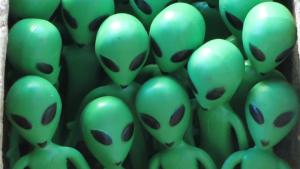
It is often asked, can Christians believe in the existence of intelligent life on other words, that is, in vernacular terms, can they believe in the existence of alien life? If so, what does the incarnation mean for them? If they have no contact with humanity, is it possible for them to be saved by Christ? If not, can they be saved? Do they need to be saved?
While many people assume the question of alien life is a recent one, in reality, the question is old, very old. Historically, we can find discussions concerning the plurality of worlds, and with it, life on those worlds, preceding the Christian era (with Lucretius famously writing on the vast size of the universe and the likelihood of there being many other planets with life). Nonetheless, as there was no one answer to the question before Christianity, after Christianity, Christians would likewise make various, differing answers, some suggesting alien life should be believed to exist, and others denying it. And then there were some who, instead of speculating on the matter, decided to remain agnostic, thinking that unless such life was ever encountered, the question itself held little to no import.
Perhaps one of the most important debates on the plurality of worlds could be found in the medieval era, with Étienne Tempier condemning those who denied the possibility that a plurality of worlds existed. Nonetheless, we must be careful when reading this condemnation, for the debate on the plurality of worlds in the medieval era tended to be less about a plurality of worlds within our own universe and more about the possibility of a plurality of universes. This is because what the medieval mind considered to be the “world” was the cosmic system in which they believed the Earth was at the center, with all the life which existed in the universe being found on the Earth. Anything which existed in the heavens were seen to be spiritual entities. Despite this difference, the reason why Tempier condemned those who denied the possibility of a plurality of worlds existing remains pertinent in regards the possibility of a plurality of worlds within our own universe: it was to preserve the omnipotence of God.
The medieval argument still has relevance to the discussion at hand, because it certainly acknowledges God’s ability to create as he wills instead of how humanity thinks he wills. But now, because we have a different understanding of the universe, its size, and contents, so we do not spiritualize what lies beyond the scope of the Earth’s atmosphere, the question of a plurality of worlds once again emerges within our own universe. Once Christians realized this, we find them talking about the possibility of alien life within our own universe, and some, like Nicholas of Cusa, promoted it.
In other words, far from what many might expect, Christianity has long discussed the concept of alien life, and it has room for it within its own cosmological understanding. The theological argument in favor or alien life is two-fold: one, dealing with their possibility, the second, as to why we should expect them to exist.
In regards the possibility, the medieval response is used: if we deny their possibility, then we deny God’s omnipotence. Since Christian theology promotes God’s omnipotence, God must be said to be capable of producing other worlds (whether or not we consider them to be worlds within our own universe, or other universes). To say they are impossible, then, is seen as contradicting a basic tenet concerning God, which is why Tempier condemned those who said such other worlds were impossible.
The argument which says we should expect other such worlds existing comes, also, from qualities which we associate with God: God is all-good. Since it is good for God to create, and it is good for God to give life to his creation, the greatness of his goodness should lead us to expect God to create a great variety of life throughout creation. When we see how large the universe is, it seems rather odd for God, who demonstrates his goodness by the proliferation of life, would create a relatively dead universe, where life is found in one small, insignificant portion of creation. If God is a God of life, we should then expect an abundance of life in the universe.
Modern science gives us more reasons to expect other intelligent life to exist in the universe. Although science cannot fully explain the origin of life, it gives many different theories for that origin. It recognizes various possible material causes for the emergence of life. And, because of the size of the universe as it is, it is unlikely that the material causes for life are found solely on the Earth. And once life begins, the process of evolution will develop that life, producing creatures of all kinds, including intelligent ones who are our equals (if not our superiors) in matters of the intellect.
Some Christians might say that because science is uncertain of the origins of life, as well as the way in which evolution does not have a teleology which automatically leads to intelligent life, they do not think science gives enough cause to belief in existence of life other than life on Earth. But if one combines what we know about God, and his omnipotence and benevolence, with what we know with science, Christians have a good reason to believe in a universe inhabited by a multitude of intelligent creatures. This is not to say we will necessarily ever encounter them. It is quite possible there are vast distances between various civilizations which exist as a way to protect them from each other. Nonetheless, some might suggest, if we take this line of thought to its proper conclusion, shouldn’t the universe be so full of life, that every planet we visit, even within our own Solar System, we should be able to find them? Historically, before our own scientific ability allowed us to properly explore space, many Christians thought this was likely; but now that we know this is not the case, and this is because a part of the reasoning behind this attitude was faulty: it was trying to establish God’s actions according to human reasoning, which, of course. God’s actions will not always follow. Nonetheless, even if they took a good principle and exaggerated it to assume too much about God, their general disposition still has value: we can easily believe God will create other life, other forms of intelligent life, within the universe, because he is good.
Belief in aliens does not mean belief that humanity will encounter such aliens. With what little scientific knowledge we have of the size and nature of the universe, and the way travel can be had within the universe, it is quite possible no such interaction will ever be possible. Belief in aliens does not mean belief that aliens have already visited us and that stories of alien encounters and abductions are true. On the other hand, Christians do not have to believe that such encounters are false, either. What is important for us is the fact that Christians can believe in the existence of aliens, and that belief can be based upon the nature Christians attribute to God.
Why, then, does Scripture not talk about aliens? Should that not be reason enough for Christians to dispute their existence? Not at all. That is merely an argument from silence. There are many things Christians have learned through the centuries which are not found in Scripture, such as the power which is had with nuclear physics. Scripture does not talk about nuclear physics, but no one today will deny its reality. The point of Scripture is not to offer a science lesson, nor does Scripture pretend to delineate all that exists within creation. We must understand Scripture was written for humanity, so that humanity can have a way to understand their own relationship with God and the way God has worked with them to save them. Nonetheless, even then, from time to time, it points out God still has relationships with others beyond humanity, such as is found with the covenant he made with all creation after the flood of Noah. Thus, we should not expect Scripture to reflect upon issues which are not centrally related to the economy of salvation for humanity, though of course, this is not to say we cannot find elements within Scripture which can be used to extrapolate answers beyond what is found in Scripture itself.
Now, if such alien life exists, and humans do not have any contact with them (or even if they do), what can Christians consider the implications of the incarnation have for them? Does the fact that God became a human man, Jesus, have any value to them? Do they even need a savior?
To answer these questions, the first thing we need to consider is whether or not such life would need a savior. Some think that only humanity is fallen, and so only humanity needs a savior. However, that seems to go against the norm of Scripture, which suggests not only humanity, but the cosmos as a whole is fallen; Scripture tells us that the whole cosmos was awaiting the incarnation and the revelation of the children of God to be freed from the contamination of sin. In this sense, Scripture offers a cosmic understanding of the incarnation, that though God became human, through the incarnation, God has a way to reconcile all things so that all things, once tainted by sin, could become saved. The universe, it is said, will become a new creation (a “new heavens and a new Earth”). Thus, it can be believed that the incarnation by itself, in ways unknown to humanity, God has found a way to work with and transform all life in creation, wherever it is at, even if it does not find itself in immediate contact with humanity: the incarnation, after all, is of the transcendent God who is everywhere present and fills all things according to his divine nature.
But it can be asked, is the whole of creation fallen, or only the creation which is immediately in contact with humanity? If we consider things carefully, it would seem that the fall happened before the creation of humanity, because many aspects of the fall (such as death) existed before the advent of humanity. Likewise, since humanity did not fall entirely by itself, but by enticement from an other (traditionally named Satan), we find fallen entities existing before humanity, apart from humanity, so that some sort of fall (at least in a temporal sense) happened before the fall of humanity. (It could be suggested that the fall of humanity, while it took place at one particular place in time and space, had a metaphysical priority so that it affected all of time and space, including that which happened before the advent of humanity, but to do so would create several paradoxes, which though are not insurmountable, are not necessary to be believed to explain the fall in creation). In this fashion, we have evidence of the effects of the fall happening before humanity, outside of direct human influence, influencing and affecting creation, so that all which comes to be in the wake of such a fall is at least tried by it. Aliens, then, can certainly can receive salvation in the classical sense, but on the other hand, it is possible to think that the limits of the fall are particular in place and time, and each intelligent species, each particular creature, could be tempted and tried on its own, with some successfully overcoming such a temptation and others falling for it (as C.S. Lewis suggested in his Space Trilogy). Nonetheless, what is important is to recognize that it is possible to believe all life itself is affected by a cosmic fall, and is in need of a savior, and the work of Jesus Christ, though accomplished in a particular time and place in the cosmos, influences the whole of creation and is capable of transforming and saving it, for we are to believe all things are reconciled in and through him. Likewise, even if other life is not itself fallen, the work of Christ is not just salvific but deifying, and so through the incarnation, God’s deifying grace is shared to the whole of creation.
Nonetheless, there is the option for Christians to believe that God the Logos, who has created all things in and through himself, as logoi within the Logos, has the potential to assume the natures of all the logoi which have been created by the Logos. That is, as the Logos creates the logoi or natures of all things, they all reflect the Logos in their own nature and so have room for the Logos to become one of them. In this way, it can be suggested, God has found a way to interact with all possible life forms, in their own particular nature and in their own particular way. Multiple incarnations, to be sure, seems to be quite troubling to the Christian mind, and is in general, rejected, but never absolutely so; it has always been considered a possibility that God could do so if God wanted to do so, and some significant Christian thinkers, at the height of such speculation, suggest it in one form or another, such as the way some have said that the Logos took on the nature of an “angel’ and so was the “angel of the Lord” before the incarnation. Even if we accept this possibility, it is important to realize that it is not necessary; one incarnation is enough to bridge the difference between Creator and creation. On the other hand, because God shows himself caring for his creation, giving various ways in which we can get to know him and interact with him, the notion of a plurality of incarnation is not against what we know of him and his nature, even if any particular incarnation, such as the incarnation we know for sure about with the assumption of humanity unto himself, is fully willed from his extraordinary benevolence. Thus, even if alien life does not encounter humanity, this does not mean God could not and would not have is way to engage such life by incarnating himself as one of them; nor does it mean, if he did, that the end result would have to be the same as it is with humanity (to assume such a conclusion is to once again embrace necessity in discussions about God, a necessity which we should avoid).
Now, even if assume that the incarnation only took place once, and humanity never makes any historical relationship with alien life, this does not mean God would leave them ignorant of the incarnation. As there are two revealing arms of God – the Logos and the Holy Spirit, it is quite possible for the Holy Spirit, going where it wills, reveals to others what it needs to know concerning the incarnation for their own religious needs. Indeed, as we witness the Holy Spirit consistently illuminates us and helps in the promotion of evangelization, it would make sense that the Holy Spirit, the Lord and giver of life, fills the universe with illumination so that even if humanity has no knowledge of what happens beyond the Earth, what lives beyond the Earth could have knowledge of what happens on the Earth. We do not have to be a silent planet, even if we ourselves are kept in the dark about what happens beyond the Earth.
In this way, then, Christians already have a concept of a cosmic incarnation, that by one incarnation, God could and does affects the whole creation. Alien life, therefore, would have no problem finding its own salvation (and deification) promoted by the work of Christ in the cross. But, if they exist, God can have other ways in which he is found interacting with them, both through the Holy Spirit, as well as with the possibility of other incarnations of the Logos. Only if and when Christians actually encounter such life will they be able to explore this question in a way beyond speculation, but what is important for Christians to realize is that their theological principles do allow for ways in which such alien life can be seen to be included in the work of Christ.
Thus, to answer our questions, until alien life is truly encountered, Christians can believe or disbelieve in its existence, but if it is ever encountered and found, Christians have enough resources to deal with their existence that it would not pose an absolute challenge to the Christian faith (though it will likely give them new knowledge and information about God and his ways in the universe; thus, encountering alien life, Christians would probably revise many of their ideas of the universe as well as various speculative views about God in order to meet the new reality).
Stay in touch! Like A Little Bit of Nothing on Facebook.
If you liked what you read, please consider sharing it with your friends and family!
















